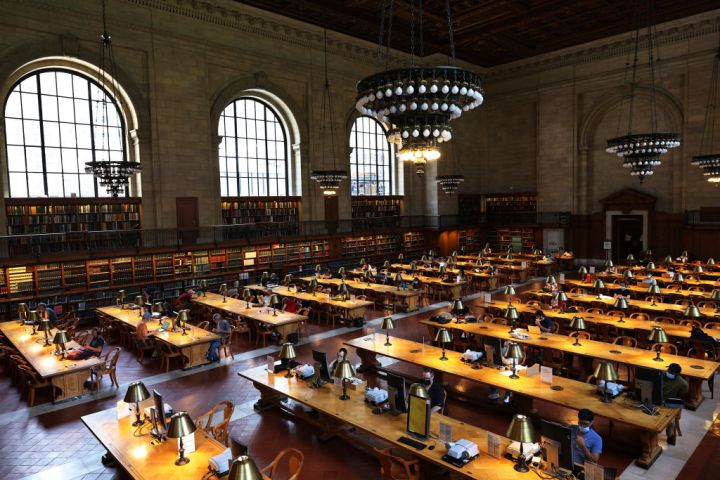
It checks out — libraries are an “investment that’s well worth it”
It checks out — libraries are an “investment that’s well worth it”

The rapid development of the digital economy led some to believe public libraries could go the way of the dinosaur. After all, why go to all the trouble to trek to your local library when you can simply find what you need with the click of a mouse?
Yet in the digital age the evidence is compelling that libraries remain vital community institutions, especially as public trust in institutions remains low and people’s connections with each other grow weaker and further apart.
Senior economics contributor Chris Farrell spoke with “Marketplace Morning Report” host David Brancaccio on how public libraries are still enriching the communities and neighborhoods they serve. Below is an edited transcript of their conversation.
David Brancaccio: I mean, a lot of people listening don’t even know what a card catalog is. But some do —
Chris Farrell: Or the Dewey Decimal System?
Brancaccio: Yeah, I love the Dewey Decimal System. It was the coding system for where you can find the books if you understood the code. But libraries have evolved to meet this new world.
Farrell: That’s right, they’ve essentially reinvented and reimagined themselves. You know, look, libraries still fulfill that traditional mission of offering books and study space for users. But libraries also help people find work, start a business, take college prep courses, apply for government benefits, learn English as a second language. And by the way, when you go to a library, you see that they’re just full of computers and offering internet connections for people to use. And, by the way, many of those people, they may not have high-tech gear at home.
Brancaccio: Yeah. Now libraries 100, 150 years ago, were the internet, the place that had the knowledge that used to be held by the gatekeepers. Andrew Carnegie, the great payer for public libraries, thought libraries were the best tool for the masses to lift themselves up, and that’s social change. What do you think now? Are libraries still a force for social change?
Farrell: Yeah, David, I really think they are instruments of social change a century later. You know, several years ago, I was in Columbia, South Carolina, and I’m talking to the head of the Public Library Workforce Development Initiative. And she said, you know, helping older workers figure out their encore careers, that was part of her mission. And later I went to the downtown library in Phoenix and I was impressed by its college depot. You know, this is a free, full-service college access center to help with everything from getting a GED [high school equivalency diploma] to a college degree. And you can multiply these examples because there are over 15,000 library branches in the U.S., and local governments spend over $12 billion annually on their libraries. And it’s safe to say, this is an investment that’s well worth it.
Brancaccio: Well, do we know that? It’s a decent return on investment?
Farrell: Well, there’s this recent study — this one grabbed my attention — [by] three economists [from] Montana State University, Federal Reserve Bank of Chicago and Miami University. And they calculate by some measures a healthy return on investment. So among their findings, library capital investment increases children’s attendance at library events by 18%, children’s checkout of items by 21% and total library visits by 21%. Now, OK, that’s interesting, but increases in library use translate into improved children’s test scores in nearby school districts.
Brancaccio: So there are interesting, almost hard-to-quantify benefits as well?
Farrell: That’s right. And that’s, you know, really the thing that stands out to me is we’re living through an era where there’s a lack of trust in so many institutions and, you know, the sense that we have connections with each other, I mean, that’s splintering. Well, public libraries are still trustworthy, community institutions and most important, public libraries are open to everyone. It doesn’t matter your age, it doesn’t matter your race, ethnicity, social class and net worth.
Brancaccio: Yeah, but then the pandemic comes by, and it’s hard on libraries. People weren’t allowed to go into some of them, budgets were cut. And you know, it’s not that so many libraries were overly funded even before the pandemic arrived.
Farrell: And this is why I think the return on investment, particularly as you’ve mentioned, the return on investment on the intangibles, is so important. So a lot more needs to be done to maintain buildings, update bathrooms, increase the number of hours that they’re open, and there’s a wonderful book by sociologist Eric Klinenberg, “Palaces for the People.” And you know, in that book, he persuasively argues that libraries, the people who work there, and the people who visit that they’re essential to our democracy, and to our community. So support your local library.
There’s a lot happening in the world. Through it all, Marketplace is here for you.
You rely on Marketplace to break down the world’s events and tell you how it affects you in a fact-based, approachable way. We rely on your financial support to keep making that possible.
Your donation today powers the independent journalism that you rely on. For just $5/month, you can help sustain Marketplace so we can keep reporting on the things that matter to you.

















